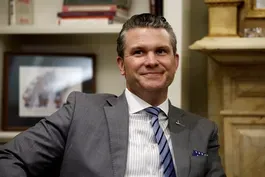
The effect of removing medical debt from credit scores
Clip: 1/25/2025 | 7m 4sVideo has Closed Captions
The effect of removing medical debt from millions of Americans’ credit scores
More than 100 million Americans are burdened with medical bills they can’t pay. In the final weeks of the Biden administration, the Consumer Financial Protection Bureau issued new rules banning credit agencies from including medical debt on credit reports, starting in March. KFF Health News senior correspondent Noam Levey joins Ali Rogin to discuss what this means for people carrying medical debt.
Major corporate funding for the PBS News Hour is provided by BDO, BNSF, Consumer Cellular, American Cruise Lines, and Raymond James. Funding for the PBS NewsHour Weekend is provided by...

The effect of removing medical debt from credit scores
Clip: 1/25/2025 | 7m 4sVideo has Closed Captions
More than 100 million Americans are burdened with medical bills they can’t pay. In the final weeks of the Biden administration, the Consumer Financial Protection Bureau issued new rules banning credit agencies from including medical debt on credit reports, starting in March. KFF Health News senior correspondent Noam Levey joins Ali Rogin to discuss what this means for people carrying medical debt.
How to Watch PBS News Hour
PBS News Hour is available to stream on pbs.org and the free PBS App, available on iPhone, Apple TV, Android TV, Android smartphones, Amazon Fire TV, Amazon Fire Tablet, Roku, Samsung Smart TV, and Vizio.
Providing Support for PBS.org
Learn Moreabout PBS online sponsorshipJOHN YANG: Cost of health care is one of the leading reasons for consumer debt in this country.
More than 100 million Americans are burdened with medical bills they can't pay.
In the final weeks of the Biden administration, the Consumer Financial Protection Bureau, or CFPB, issued new rules banning credit agencies from including medical debt on credit reports.
Those rules are set to take effect in mid-March.
Ali Rogan discussed what this new protection will mean for people carrying medical debt with Noam Levey, a senior correspondent with KFF Health News.
ALI ROGIN: Noam Levey, thank you so much for joining us.
So tell us first about what sort of medical debt ends up on people's credit reports.
NOAM LEVEY, KFF Health News: So most people probably are familiar with if they don't pay a medical bill, maybe it gets sent to collections.
But only some medical bills actually get reported on people's credit scores.
So it's really depends on kind of what the hospital or what the doctor does.
But the tricky thing for consumers is you may not know or patients, you may not know when you go to the hospital how much jeopardy you're really in.
ALI ROGIN: But now this new rule is going to eliminate that completely, Right?
Tell us how that's going to work.
NOAM LEVEY: That's right.
So there are about 15 million people who still have some kind of medical debt on their credit score.
And what this regulation will do is force the credit reporting agencies to remove those bills so people will no longer have any medical debt on their credit reports.
And it will also prohibit lenders from considering unpaid medical bills as they make decisions about whether or not to extend somebody a mortgage or some other kind of loan.
ALI ROGIN: Is this going to have a retroactive effect or how is that going to work?
NOAM LEVEY: Effectively, yes, because if you have a medical bill on there, it's going to go away.
There's a tricky part of this in the sense that if you've put a medical bill on a credit card or you've taken out some other kind of loan, and we know people are doing this a lot, that is still going to show up on a credit score as like credit card debt.
ALI ROGIN: To what extent does medical debt tend to indicate whether somebody is credit worthy or not?
NOAM LEVEY: Well, so this was one of the main reasons why the Consumer Financial Protection Bureau said that it wanted to put this regulation in place.
The reason for having dings on the credit report is so that lenders can look at it and say, well, this person, you know, hasn't paid their auto loan, they're behind on their credit card, maybe it's not a good thing to extend them a mortgage.
But when the CFPB looked at this, they said, in fact, people are not paying their medical bills.
That's not a very good indicator about what kind of a risk they may be.
Now, it should be pointed out that the folks that are challenging this rule and the credit reporting industry, as well as the collections industry, are actually suing to stop this regulation.
They have argued, among other things, that analysis by CFPB is flawed.
So I'm sure there'll be a lot of debate in the courts coming up about whether or not in fact, that analysis.
ALI ROGIN: Absolutely.
Before I ask you about the other side of this, I do want to play some sound from folks across the country who have been dealing with medical debt.
Let's have a listen.
CHRISTOPHER STARK, Wichita, Kansas: My name is Christopher Stark and I live in Wichita, Kansas.
MELISSA PITTARD, Arlington, Virginia: My name is Melissa Pittard.
I live in Arlington, Virginia.
KELLY GEORGES, St. Louis, Missouri: I'm Kelly Georges and I'm from St. Louis, Missouri.
CHARLES BOYD, WICHITA, KANSAS: My name is Charles Boyd.
I'm from here in Wichita, Kansas.
KELLY GEORGES: You know, nobody says, oh well, you're sick.
Let's not send you an electric bill this month.
That doesn't happen.
All your bills are still there.
And so you just start chipping away at your savings, chipping away at everything you have.
And ultimately chipping away at retirement.
CHARLES BOYD: When you have multiple medical situations, multiple medical bills out there from different specialists, different hospitals, and different collection agencies, you don't get to sleep without thinking about it sometimes.
CHRISTOPHER STARK: The medical debt that I have accumulated over the past few years has really impacted me, both obviously financially and as well as it's affected my mental health.
MELISSA PITTARD: I've had to creatively finance this medical debt, and I'm sure it affected my credit score, but I'm not sure how I've been chased by debt collectors.
CHRISTOPHER STARK: I like that the Biden administration moved to remove medical debt from credit reports.
And I think it's definitely taken a big burden off of my shoulders.
MELISSA PITTARD: I think it's needed to be done for a long time.
But for those of us who have been faced with doctors and specialists, other people, you're still going to end up being in trouble because you have to pay for it one way or another.
ALI ROGIN: Are these stories similar to the ones that you've heard in your reporting?
NOAM LEVEY: Yeah.
So we've been writing about medical debt for the last several years, and, you know, I've interviewed hundreds of people across the country.
And I think one thing that bears underlining is it's hard really to overstate the suffering that people are enduring because of medical bills.
And I mean, you saw, I think, some of the emotion there in people living with the stress of being unable to pay a bill or having to drain their retirement savings.
ALI ROGIN: What is the argument from the other side?
What's the argument in favor of keeping medical debt on credit reports?
NAOM LEVEY: I mean, there are a couple different arguments, one of which is from the credit reporting agencies, if you're going to be lending people money, you want to make sure that they're a good risk.
If those safeguards aren't in place, could we get back to a situation where were before the 2008, 2009 financial crisis where there was loose credit and people were taken on mortgages they couldn't pay, et cetera.
I think the other argument, which is an interesting one, is that from the collections industry, is essentially that if medical offices, hospitals are not able to essentially have a threat to report you if you don't pay your bill, they're going to start demanding that you pay up front before you actually get your procedure.
And there's an argument to be made that if that happens, does that actually put more barriers in front of people?
ALI ROGIN: And all of this motivates the question.
Is this just a band aid for broader problems in our health care system here in America?
NOAM LEVEY: Sure.
I mean, yes, it is a band aid.
I mean, there are much bigger problems.
The underlying problem is people can't pay $2,000 medical bills.
Right.
So they end up going into debt, goes on their credit reports and what have you.
I would say that some of the efforts to address sort of the worst problems associated with medical debt, like credit reporting, like people being sued, people having liens on their homes, these sorts of things probably deserve to be addressed even before we get to the much more difficult and complicated issues of how we make it cheaper to go to the hospital, how we make it cheaper to get a prescription at the pharmacy or an MRI or an X ray.
And that's a subject for another day.
ALI ROGIN: Bigger questions, certainly.
Noam Levy with KFF Health News.
Thank you so much.
NOAM LEVEY: Thanks.
AI transcription tool ‘hallucinates’ medical interactions
Video has Closed Captions
What to know about an AI transcription tool that ‘hallucinates’ medical interactions (5m 53s)
News Wrap: Hegseth sworn in as Trump’s defense secretary
Video has Closed Captions
News Wrap: Pete Hegseth sworn in as Trump’s defense secretary (2m 15s)
Uncertainty looms over Israel’s fragile truce in Lebanon
Video has Closed Captions
Uncertainty looms over Israel’s truce in Lebanon ahead of troop withdrawal deadline (8m 19s)
Providing Support for PBS.org
Learn Moreabout PBS online sponsorshipMajor corporate funding for the PBS News Hour is provided by BDO, BNSF, Consumer Cellular, American Cruise Lines, and Raymond James. Funding for the PBS NewsHour Weekend is provided by...















